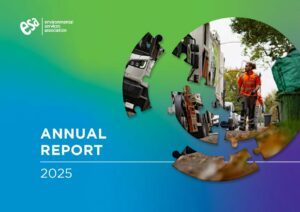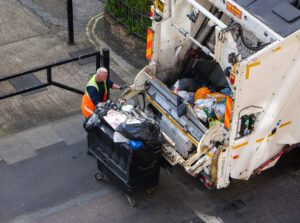Incorrect binning of dangerous items contributes to hundreds of serious waste fires across the UK.
Many householders across the United Kingdom don’t feel confident they know how to safely dispose of a range of common domestic flammable or explosive items which are responsible for hundreds of serious waste fires every year.
The results of a recent national YouGov Poll of more that 2,000 adults (2,056), commissioned by the Environmental Services Association (ESA), found that the majority of those asked said they were not confident they knew how to safely dispose of used vape devices, compressed gas canisters (including patio gas and nitrous oxide), lighter fuel, fireworks or old petrol.
Claimed confidence levels about safe disposal methods were higher for items such as batteries, aerosols and barbeque ashes, although the poll also found that nearly a fifth of people admitted to binning batteries (19%) and aerosols (18%) at least once in the past year, while nearly 8 percent of respondents admitted to putting vape devices in their general waste bin, which was a similar figure for cigarette lighters too.
From a list of domestic flammable or explosive items, the poll findings suggest that batteries, aerosols, vapes and cigarette lighters were the most-binned by householders over the past year, despite efforts by the industry, local authorities and media to warn the public of the dangers of doing so.
Fires occurring within waste containers, collection vehicles and processing facilities are a perennial risk for the recycling and waste management sector but the number of serious fires rises during the summer months because fires spread more quickly through drier waste material and there are additional seasonal sources of ignition present in the waste (for example BBQ ashes and camping gas).
Every year, fire and rescue services have to attend at least 300 significant fires1 at recycling and waste management facilities across England. However, the total number of smaller un-reported fire incidents occurring across the sector is estimated to be significantly higher than this, since hundreds of fires are extinguished by operators before the need to call the emergency services.
To help address this fire risk, and in response to the YouGov poll findings, the ESA launched a social media campaign, warning the public not to cause a “bincident” and to be mindful about what they put in their bin or recycling this summer. The campaign urges householders to instead take flammable or explosive items to their local household waste recycling centre or check with their local council about which service to use.
Executive Director of the ESA, Jacob Hayler, said:
“It is clear from YouGov’s poll results that there is still more work to be done to help householders know what to do with a range of common domestic flammable or explosive items if we are to minimise the huge damage they can cause.
Hidden in wheeled bins or kerbside recycling containers, common household items like gas canisters, batteries, vapes, aerosols, barbeque ashes and cigarette lighters are responsible for hundreds of fires across our sector, which put lives at risk, damage essential infrastructure and threaten the natural environment – while also costing the public purse millions of pounds each year.
The risks are magnified during the hot summer months when waste material is dry and we tend to see more seasonal causes of fires like hot BBQ ashes and gas canisters present in waste.
Local authorities, manufacturers of these items, and the waste sector, must all continue to communicate the dangers of improper disposal, which is why the ESA has launched a social media campaign this summer and made it available for all to use.
We urge householders to help avoid a ‘bincident’ by being mindful about what they put in their bin or mixed recycling, and by checking their local services to find the correct disposal route.”
The campaign assets include a range of social media graphics and these can be downloaded for free.
All poll figures, unless otherwise stated, are from YouGov Plc. Total sample size was 2056 adults. Fieldwork was undertaken between 22nd – 23rd May 2023.
The survey was carried out online. The figures have been weighted and are representative of all UK adults (aged 18+). Headline findings and the raw dataset is available on request to b-johnson@esauk.org




